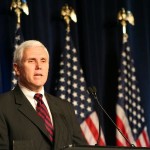The GOP Dodges the Pence Bullet
 Many conservatives were disappointed when Rep. Pence announced he wouldn't run for the presidency. But what made them ever think he would make a good president?
Many conservatives were disappointed when Rep. Pence announced he wouldn't run for the presidency. But what made them ever think he would make a good president?
Why were so many conservatives disappointed when Rep. Mike Pence (R, IN) announced that he would run for governor of Indiana rather than presidency next year? Where exactly is the evidence that he would be a good president? The most serious crisis that the vast majority of the current and recent members of Congress had to deal with was the financial crisis in late 2008. The entire financial system was about to collapse and to plunge the US (and probably most of the world) into a major depression. Congress took its responsibility very seriously and quickly debated and passed TARP, aka the Wall Street bailout. The US still suffered the worst recession since WWII, but the worst was averted. No thanks to Mike Pence who not only voted against the bailout but actually led the charge against it. Why? And why did all the hagiographic coverage of him in conservative media last week fail to analyze this question? Here are a few possible reasons and their implications.
- There was an argument that the bailout just cost too much and the government was already deeply in debt. Well, if the economy collapsed, the government would lose trillions in tax revenues, so even giving a gift of several hundred billion dollars to fat cat bankers to avoid that would be a bargain. But in reality the bailout did not even cost the government anything – it actually made a profit! While the Democrats have a very annoying habit of incorrectly referring to government spending as “investing”, here was a very rare case where it was indeed true. If Pence objected on the basis of cost, he must have done not one but two incorrect assumptions – that the bailout was going to cost the government a lot of money and that it was not worth it. If that’s indeed the case, it raises serious questions about his judgment.
- There was a lot of hysteria on the right about the government nationalizing the banks. As it happens, the government has already liquidated the stake it temporarily took in the banks (for that matter, even if there was a nationalization of banks – which would surely be undone by some future administration, - would that be even worse for the economy than the total collapse of the banking system?). If that was Pence’s concern, that again raises questions about his judgment – as well as questions about his ability to govern if he genuinely believes that Pelosi and Reid plot a socialist takeover of the United States.
- There was a moral argument that the recipients did not deserve the bailout. This is simply not a serious objection. The government gives taxpayer money to undeserving individuals and entities all the time. Life ain’t fair. Anyway, what about the many millions of Americans who lived within their means and did nothing to cause the crisis? Did they deserve to go through years (if not decades) of misery that would inevitably follow a massive banking collapse?! If Pence believes that the most important thing in that situation was to punish evil greedy capitalists, perhaps he should consider switching parties and challenging Obama from the left in the Democratic primaries.
- Moral hazard is about the only truly serious legitimate objection that I can think of. Yes, it is true that by upholding the concept of “too big to fail” we encourage big institutions to behave more recklessly and thus increase the likelihood that some of them will fail in the future (the standard conservative objection to bailouts is actually based on this simple practical consideration – not on some sacred texts by Adam Smith or Milton Friedman). But that future likelihood had to be balanced against the near certain systemic failure in the here and now, and it was really a no-brainer. Quite often in politics in general and almost always in a bad crisis the choice is not between good and bad options but rather between bad and worse options. If Pence failed to discern the lesser of two evils correctly, that again raises serious questions about his judgment (as well as his understanding of conservative principles).
- Finally, there’s a really disturbing possibility that Pence actually knew that the bailout was the correct policy but also knew that it was the wrong politics (since it was deeply unpopular), and that he wanted to preserve his viability in future Republican presidential primaries. I am inclined to give a pass to Republican politicians who now pander to the primary voters and badmouth TARP even though they should know better (and in fact do). However members of Congress had the tough luck of having the responsibility to actually do something about TARP, and their votes on the matter were arguably the most consequential congressional votes over the last several decades. This raises a question of whether a man in a position of great responsibility who in a grave crisis does what’s popular rather than what’s right is fit for public office, let alone the highest office in the land.
Tweet